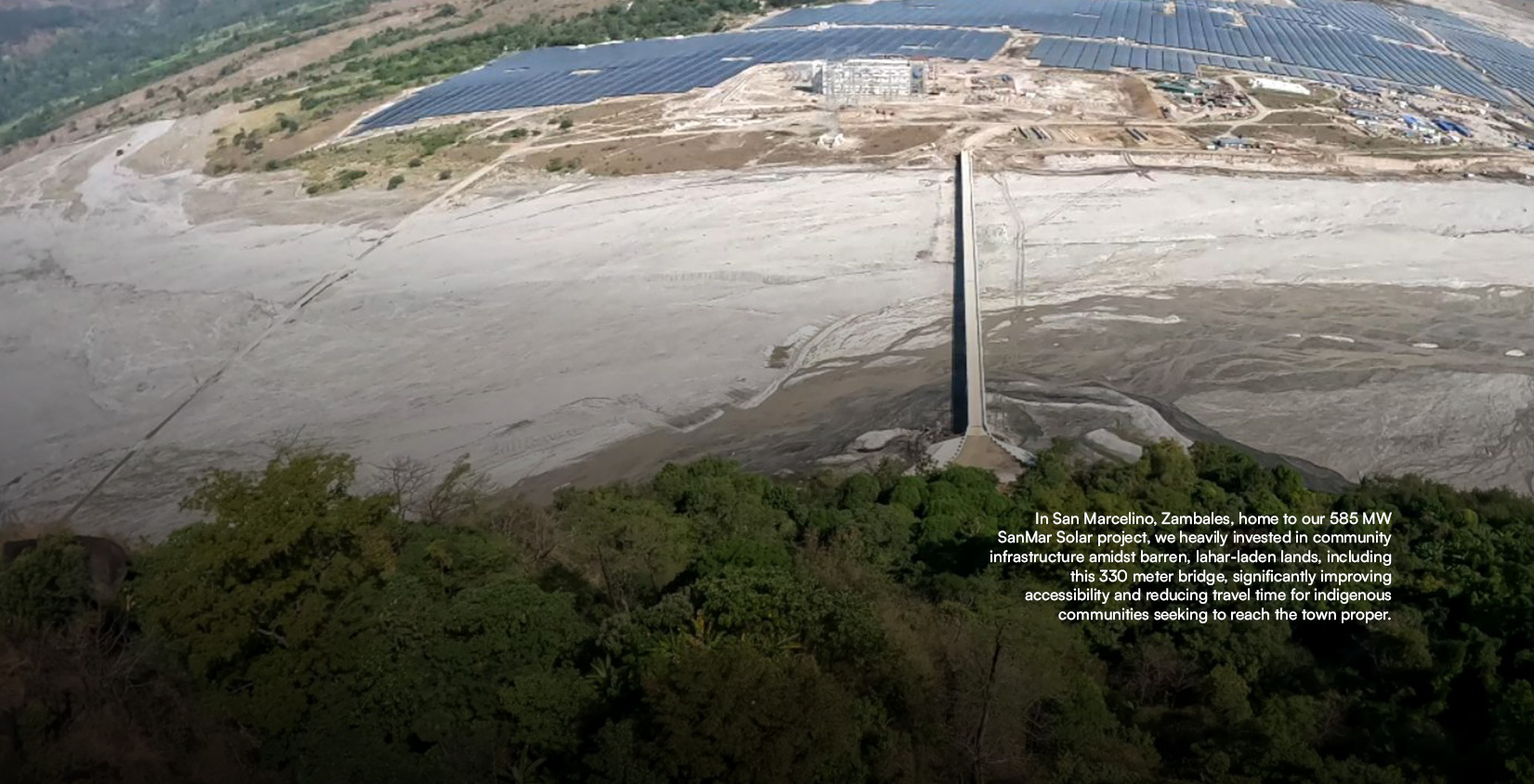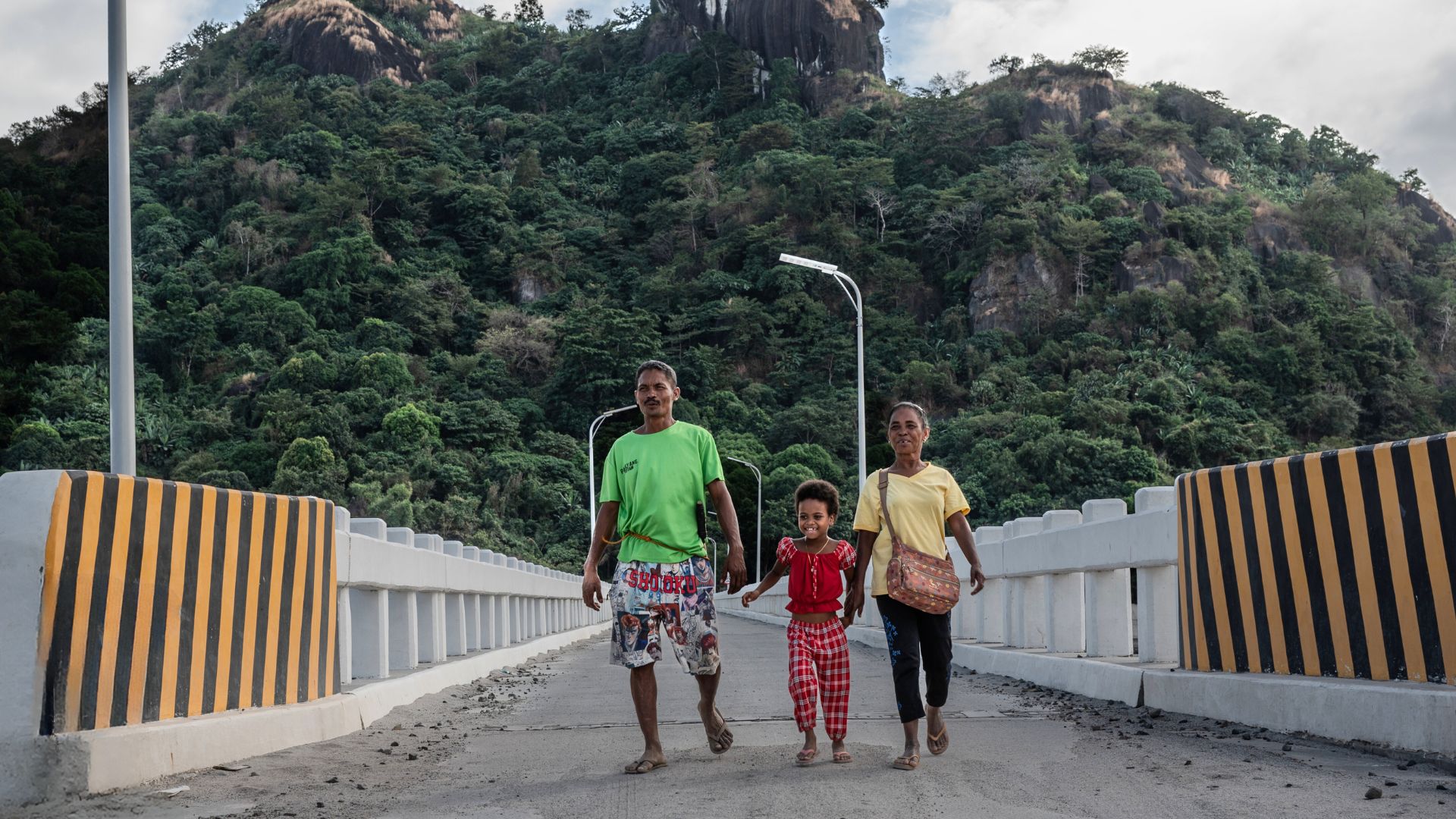-

Social programs
Home » Sustainability » ESG » Social » Our community » Social programs
Home » Sustainability » ESG » Social » Our community » Social programs
Our social investments go beyond mere infrastructure development; they encompass comprehensive programs aimed at fostering the socio-economic progress of our host communities. By closely collaborating with local government units, state agencies, indigenous peoples and conservation groups, we establish initiatives designed to serve as catalysts for positive change.
Through livelihood creation, large-scale infrastructure enhancements, heightened awareness of community health and safety, disaster response readiness and innovative waste management strategies, we strive to generate tangible, enduring impact on the communities we serve.
We believe that by taking into consideration the needs and aspirations of our host communities, we not only strengthen our relationships but also cultivate a mutually beneficial environment where sustainability flourishes.


As we go full speed in our renewables expansion, we not only assess our environmental impact but also evaluate our potential social impact. In the early development stage, we proactively identify opportunities for building infrastructure that not only facilitates project construction and operations but also benefits our host communities.
Strategic approach and SPI alignment
Philippines initiatives:
Global contributions:
 Aside from developing the 585 MW SanMar Solar, we also built large-scale infrastructure in San Marcelino, Zambales. This includes a 14-kilometer power transmission line, almost six kilometers of access road and two concrete bridges, significantly reducing travel time and improving accessibility for the IP communities who used to walk three to five hours by foot or motorcycle when going to the San Marcelino town proper to sell their goods.
Aside from developing the 585 MW SanMar Solar, we also built large-scale infrastructure in San Marcelino, Zambales. This includes a 14-kilometer power transmission line, almost six kilometers of access road and two concrete bridges, significantly reducing travel time and improving accessibility for the IP communities who used to walk three to five hours by foot or motorcycle when going to the San Marcelino town proper to sell their goods.
Moving forward
As a responsible renewables player, we are committed to continuing our engagement with host communities to develop mutually beneficial infrastructure projects. By integrating community needs into our project planning, we aim to lead the renewables revolution while fostering inclusive and sustainable development as aligned with the Ayala commitment to nation-building, ensuring our infrastructure initiatives align with and support the social progress.
We believe in the potential of the next generation in breaking cycles of poverty and inequality through proper access to education. Our investments in education empower and support not just students but also teachers in our host communities in creating a safe and inclusive learning environment for them to thrive and effectively contribute to sustainable development.

Strategic approach and SPI alignment
Philippines initiatives:
Global contributions:

Moving forward
We are dedicated to further strengthening our education programs by incorporating holistic approaches that integrate climate action and sustainability. Our aim is to enhance our outreach activities to schools by advocating the integration of climate change and sustainability education in local schools. We will continue to collaborate with educators, local governments and community organizations to develop innovative programs that foster environmental literacy, promote renewable energy awareness and inspire action towards a greener and more sustainable future.
We recognize that a thriving community is integral to the success of our operations, and we strive to create shared value by investing in local livelihood opportunities. As aligned with our core values, we have established programs aimed at expanding economic opportunities for our local communities. These initiatives go beyond mere charity; they are designed to build capacity, enhance skills and create pathways to economic self-sufficiency.
We create green jobs in the development of our renewable energy projects and infrastructure, generating a ripple effect that opens doors for local communities to engage with various businesses such as resorts, hotels, dormitories, restaurants, food stalls, and related industries in our supply chain. Throughout our operations, we remain committed to bolstering local suppliers and implementing initiatives that support small-to-medium enterprises within our areas of operation, ensuring the sustained creation of mutual value.

Strategic approach and SPI alignment
Philippines initiatives:
Global contributions:

In addition to the highlighted initiatives, we also focus on inclusivity and sustainability in our livelihood creation efforts:
Moving forward
We are dedicated to expanding our livelihood creation initiatives to include upskilling and promoting social entrepreneurship. Beyond providing income opportunities, we aim to equip community members with essential skills and support establishing social businesses. Through these efforts, we seek to empower individuals and foster economic self-sufficiency, creating a lasting positive impact on our host communities.

We are committed to protecting and empowering indigenous peoples across our markets. Our aim is to develop programs that ensure they have access to quality education, healthcare, economic opportunities while preserving their cultural heritage. Throughout our operations, we put importance in the integration of indigenous knowledge and traditional practices, with the goal of promoting resilience and inclusivity and cultivate meaningful collaborations.

Strategic approach and SPI alignment
Philippine initiatives:
Global initiatives:
Moving forward
We will continue to enhance our initiatives for indigenous peoples across multiple domains, encompassing infrastructure, healthcare, livelihood and training. Working closely with community leaders, we will customize programs to meet their distinct needs and aspirations, thereby providing significant assistance for the well-being and cultural preservation of indigenous populations. Our objective is to establish an enduring relationship in the communities we engage with.
We place utmost importance on improving the health and well-being of our communities.
By forging strategic alliances with local organizations, our goal is to establish a diverse array of health and wellness programs to cater different segments of the population, including school children, youth, senior citizens, women and other community members.

Strategic approach and SPI alignment
Philippine initiatives:
Global contributions:
Moving forward
We will remain steadfast in implementing programs aimed at improving health and sanitation practices and promoting hygiene education within the communities we serve. These initiatives will play a crucial role in preventing the spread of diseases and fostering overall well-being within the communities we serve, especially in a post-pandemic world.
The Philippines, our home market, is among the high risk countries in terms of climate change. That’s why we always place paramount importance on disaster preparedness and environmental conservation. Our efforts on environmental conservation are supported by initiatives on skills and capacity-building for our host communities to make them resilient to climate change and prepare them for other emergencies.

Strategic approach and SPI alignment
Philippine initiatives
Global initiatives:
Moving forward
We will continue to fortify our collaborations with stakeholders and local partners to devise and execute initiatives that strengthen disaster preparedness measures and build community resilience. Through investments in education, training and necessary equipment, our goal is to empower both individuals and families to adeptly address emergencies and champion environmental conservation efforts.